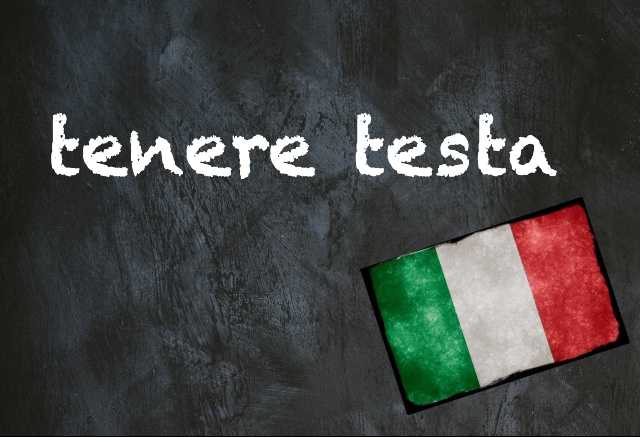Italian expression of the day: Tenere testa

See if you can hold your own with this Italian phrase.
The Italian words tenere and testa separately mean 'to hold/keep' and 'head', so it would be reasonable to hazard a guess the phrase tenere testa means 'to keep your head' - reasonable, but wrong.
In fact tenere testa means any of hold your own against, keep up with, be a match for, or stand up to.
La sua pasticceria si è rivelata così popolare che ha dovuto assumere altri due dipendenti per tenere testa alle richieste!
Her bakery's proven so popular she's had to hire two more employees to keep up with the demand!
Temo che non riuscirò a tener testa al resto della classe.
I'm afraid I won't be able to keep up with the rest of the class.
Non può tenermi testa.
He's no match for me.
You'll often see or hear the final e on the end of tenere dropped, like in the second example above - this is common in spoken Italian where one infinitive follows another (like dover andare, 'to have to go'), or when you have a set phrase starting with an infinitive (like aver fame, 'to be hungry').
Note that although in English we can talk about someone 'holding their own' in isolation, tenere testa is transitive, meaning it requires an object; you should mention who or what the subject is holding their own against.
As mentioned above, tenere testa doesn't just mean to keep up, but can also be used in a more combative sense to talk about facing off against someone.
È ora di tener testa a quei bulli.
It's time we stood up to those bullies.
Se ci uniamo, possiamo tenere testa alle multinazionali che vogliono sottrarci le risorse.
If we band together, we can stand against the multinationals who want to take our resources from us.
Il dibattito è durato ore, ma gli ho tenuto testa.
The debate went on for hours, but I held my own against him.
Whether you want to tener testa in your language classes or with a noisy neighbour who keeps you up at night, with this phrase now in your arsenal, we're confident you're up to the challenge.
Do you have an Italian word you’d like us to feature? If so, please email us with your suggestion.
Don't miss any of our Italian words and expressions of the day by downloading our new app (available on Apple and Android) and then selecting the Italian Word of the Day in your Notification options via the User button.
Comments
See Also
The Italian words tenere and testa separately mean 'to hold/keep' and 'head', so it would be reasonable to hazard a guess the phrase tenere testa means 'to keep your head' - reasonable, but wrong.
In fact tenere testa means any of hold your own against, keep up with, be a match for, or stand up to.
La sua pasticceria si è rivelata così popolare che ha dovuto assumere altri due dipendenti per tenere testa alle richieste!
Her bakery's proven so popular she's had to hire two more employees to keep up with the demand!
Temo che non riuscirò a tener testa al resto della classe.
I'm afraid I won't be able to keep up with the rest of the class.
Non può tenermi testa.
He's no match for me.
You'll often see or hear the final e on the end of tenere dropped, like in the second example above - this is common in spoken Italian where one infinitive follows another (like dover andare, 'to have to go'), or when you have a set phrase starting with an infinitive (like aver fame, 'to be hungry').
Note that although in English we can talk about someone 'holding their own' in isolation, tenere testa is transitive, meaning it requires an object; you should mention who or what the subject is holding their own against.
As mentioned above, tenere testa doesn't just mean to keep up, but can also be used in a more combative sense to talk about facing off against someone.
È ora di tener testa a quei bulli.
It's time we stood up to those bullies.
Se ci uniamo, possiamo tenere testa alle multinazionali che vogliono sottrarci le risorse.
If we band together, we can stand against the multinationals who want to take our resources from us.
Il dibattito è durato ore, ma gli ho tenuto testa.
The debate went on for hours, but I held my own against him.
Whether you want to tener testa in your language classes or with a noisy neighbour who keeps you up at night, with this phrase now in your arsenal, we're confident you're up to the challenge.
Do you have an Italian word you’d like us to feature? If so, please email us with your suggestion.
Don't miss any of our Italian words and expressions of the day by downloading our new app (available on Apple and Android) and then selecting the Italian Word of the Day in your Notification options via the User button.

Join the conversation in our comments section below. Share your own views and experience and if you have a question or suggestion for our journalists then email us at [email protected].
Please keep comments civil, constructive and on topic – and make sure to read our terms of use before getting involved.
Please log in here to leave a comment.